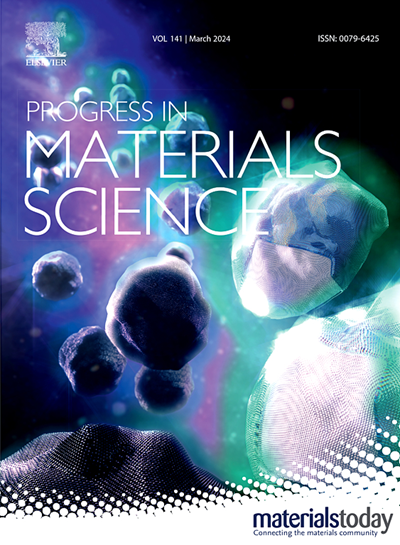Film capacitor materials for electric vehicle applications: Status quo and future prospects
IF 40
1区 材料科学
Q1 MATERIALS SCIENCE, MULTIDISCIPLINARY
引用次数: 0
Abstract
Owing to the urgent global demand for carbon emission reduction and enhanced energy efficiency, advanced semiconductor power devices in the electric vehicle (EV) industry have been increasingly adopted, and significant improvements in energy efficiency and the miniaturization of EV electrical systems have been made. A key component in this technological evolution is the polymer film capacitor, characterized by its high-voltage, high-frequency, and high-reliability performance, which makes it pivotal for advanced EV electrical systems. This review explores the critical role of polymer film capacitors in EV traction and charging systems, and by analyzing their operational principles, identifies the unique challenges faced by the energy storage polymers in capacitors developed for these applications. A systematic review of the research focused on enhancing the performance of energy storage polymers, with a goal of increasing the dielectric constant, improving the breakdown strength, optimizing structural designs, and modulating charge carriers, is also provided. Furthermore, this review highlights the discrepancies between industrial-scale manufacturing and laboratory fabrication. This study concludes with an assessment of several innovative laboratory preparation methods and strategies that have potential in scale-up production, mapping new trajectories for research aimed at optimizing polymer film capacitor dielectrics for EV applications.
薄膜电容器材料在电动汽车中的应用:现状与未来展望
由于全球对减少碳排放和提高能效的迫切需求,先进的半导体功率器件在电动汽车行业得到越来越多的应用,电动汽车电气系统的能效和小型化得到了显著提高。聚合物薄膜电容器是这一技术发展的关键组成部分,其特点是具有高电压、高频和高可靠性的性能,这使其成为先进电动汽车电气系统的关键。本文探讨了聚合物薄膜电容器在电动汽车牵引和充电系统中的关键作用,并通过分析其工作原理,确定了为这些应用开发的储能聚合物电容器所面临的独特挑战。本文还对提高储能聚合物的介电常数、提高击穿强度、优化结构设计和调制载流子等方面的研究进行了系统综述。此外,这篇综述强调了工业规模制造和实验室制造之间的差异。本研究最后评估了几种具有大规模生产潜力的创新实验室制备方法和策略,为优化电动汽车应用的聚合物薄膜电容器电介质的研究绘制了新的轨迹。
本文章由计算机程序翻译,如有差异,请以英文原文为准。
求助全文
约1分钟内获得全文
求助全文
来源期刊

Progress in Materials Science
工程技术-材料科学:综合
CiteScore
59.60
自引率
0.80%
发文量
101
审稿时长
11.4 months
期刊介绍:
Progress in Materials Science is a journal that publishes authoritative and critical reviews of recent advances in the science of materials. The focus of the journal is on the fundamental aspects of materials science, particularly those concerning microstructure and nanostructure and their relationship to properties. Emphasis is also placed on the thermodynamics, kinetics, mechanisms, and modeling of processes within materials, as well as the understanding of material properties in engineering and other applications.
The journal welcomes reviews from authors who are active leaders in the field of materials science and have a strong scientific track record. Materials of interest include metallic, ceramic, polymeric, biological, medical, and composite materials in all forms.
Manuscripts submitted to Progress in Materials Science are generally longer than those found in other research journals. While the focus is on invited reviews, interested authors may submit a proposal for consideration. Non-invited manuscripts are required to be preceded by the submission of a proposal. Authors publishing in Progress in Materials Science have the option to publish their research via subscription or open access. Open access publication requires the author or research funder to meet a publication fee (APC).
Abstracting and indexing services for Progress in Materials Science include Current Contents, Science Citation Index Expanded, Materials Science Citation Index, Chemical Abstracts, Engineering Index, INSPEC, and Scopus.
 求助内容:
求助内容: 应助结果提醒方式:
应助结果提醒方式:


